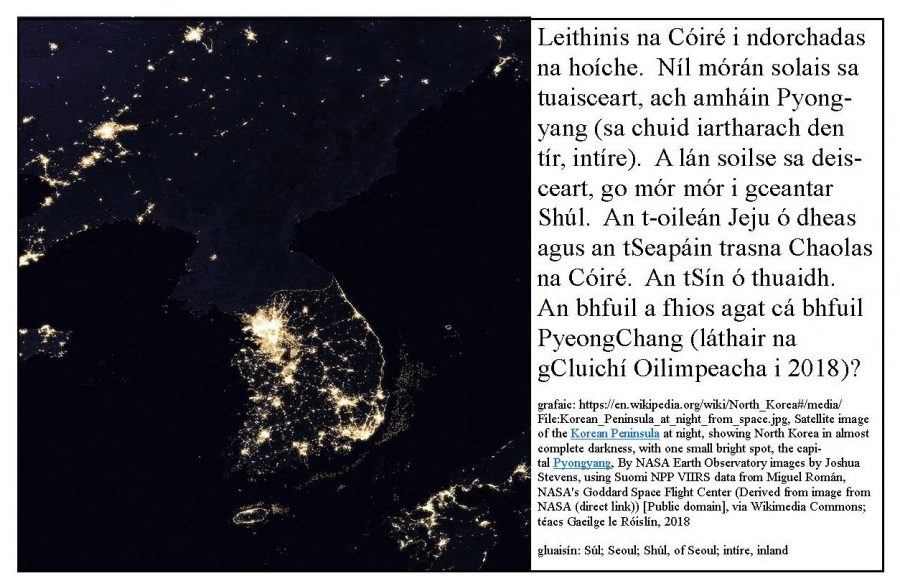How to Say ‘North Korea’ and ‘South Korea’ in Irish, and Some Other ‘North/South’ Combinations Posted by róislín on Feb 21, 2018 in Irish Language
(le Róislín)
The Irish for “Korea” is “Cóiré,” one of relatively few words in Irish that end in with a long “é.” Of the few others, there are “finné” and “inné” but most of the rest are direct adaptations from either English (e.g. giúiré, libhré) or Greek (e.g. Antaiginé, Circé) or other languages (e.g. bailé, seár-pé) or they are place names (An Chrimé, Poimpé). Of course, those samples don’t include some traditional monosyllabic Irish words (e.g. é, sé, Dé, gé, ré) or compound words based on them (e.g. cruachré, seanré, tearc-chré).The language is “Cóiréis” and a Korean person is a “Cóiréach. The Korean peninsula is “Leithinis na Cóiré.” The word “leithinis,” like its English counterpart, literally means “half-island.”
For the South and North distinction, we use “Theas” (South) and “Thuaidh” (North). Note that these two words are “permanently lenited,” meaning they always start with “th,” which is very rare in Irish. Anyway, we have “An Chóiré Theas” and “An Chóiré Thuaidh.”
Of course, both An Chóiré Theas and An Chóiré Thuaidh have full official names: Poblacht na Cóiré (Republic of Korea) for the South and Daon-Phoblacht Dhaonlathach na Cóiré (Democratic People’s Republic of Korea) for the North. Note that we drop the séimhiú (the “h” of the “Ch” cluster) here, as we do with “muintir na Cóiré Theas,” “rialtas na Cóiré Thuaidh,” and “sainbhia na Cóiré, ‘kimchi’, mar shampla.” The reason is we’re saying “of Korea” and this h-dropping rule kicks in, as it would if we were saying “of the hen” (na circe, from “an chearc“) or “of the cell/churchyard” (na cille, from “an chill“).
Additional examples of “Cóiré” (with no “h”) are:
Súl, príomhchathair na Cóiré Theas
Pyongyang, príomhchathair na Cóiré Thuaidh (not to be mistaken with “PyeongChang,” the site of the 2018 Winter Olympics — if the connection took you “aniar aduaidh,” you might want to check out the links below — níl tú i d’aonar!)
Here are a few other South/North combinations:
Baile Átha Cliath Thuaidh / Baile Átha Cliath Theas
An Bhreatain Bheag Thuaidh / An Bhreatain Bheag Theas
Meiriceá Thuaidh / Meiriceá Theas
Officially, it seems, the pairs of US states like North/South Dakota and North/South Carolina, are supposed to stay completely in English. But most Irish speakers I know in the US apply “Thuaidh” and “Theas” anyway, giving us, for example: Dakota Thuaidh (and “i nDakota Thuaidh“) and Carolina Theas (and “i gCarolina Theas“).
Here are a couple of “Souths” without official “Norths”: an tSúdáin Theas (Poblacht na Súdáine Theas) and “An Afraic Theas “(Poblacht na Afraice Theas).
Regarding Sudan, the northern country is generally called just “an tSúdain” although it may be referred to as “North Sudan” in English. But I find no references online for “An tSúdáin” plus “Thuaidh,” so if “North Sudan” isn’t the official name in English, an Irish version seems to be virtually non-existent Of course, it could be in print somewhere and just not show up online, but I think the Google search is a good general linguistic barometer of usage.
Regarding “An Afraic Theas,” no “North Africa” exists as a sovereign nation; there is of course “North Africa,” An Afraic Thuaidh,” as a term for the geographic region.
And here are a couple of “Norths” without “Souths”: An Réalta Thuaidh (unless “Cros an Deiscirt” counts as a counterpart, but it’s not really the same linguistic structure at all). And possibly we could consider “An Mhuir Thuaidh,” at least if comparing with English, because we usually say “South Seas” (not an exact counterpart), although, it’s true we have “Baothchuideachta na Farraige Theas” and “Oileáin na Mara Theas” (note the two different keywords: farraige, mara/muir) where “South Sea” is used as a modifier. Fad m’eolais, níl aon “South Sea as such” ann
For what it’s worth, though, I don’t recall anyone ever saying in Irish that they live in “Oráiste Theas,” or for that matter “Oráiste Thiar” or “Oráiste Thoir.” There’s no “North Orange,” so there wouldn’t be an “Oráiste Thuaidh,” anyway. That ones for all you New Jerseyans that might be reading this (muintir Nua-Gheirsí? lucht Nua-Gheirsí, Geirsígh?) By, the way, formalities aside, every reasonably fluent Irish speaker from New Jersey that I’ve heard uses either “Nua-Gheirsí” (or somewhat less typically “Geansaí Nua” or “Geirsí Nua“), even if the official version is English (New Jersey). SGF — Róislín
Nóta: Regarding the other words with a final “-é” ending, here’s a representative sample of a few more.
From English: faraidé
From Greek: Antaiginé, Odaisé, Péinealaipé
From other languages: ataisé, cearáité, maité, péóité
Place names: An Eiritré, Teasaloinicé
Naisc faoi na cathracha Pyongyang agus PyeongChang (agus litriú PyeongChang vs. Pyongchang)

Build vocabulary, practice pronunciation, and more with Transparent Language Online. Available anytime, anywhere, on any device.





Leave a comment: